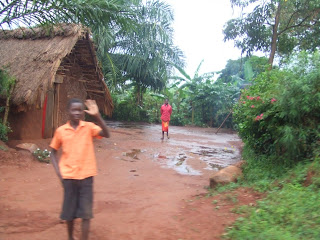I am very late in posting this but as I had such a good time a few weekends ago thought I'd still share with you what I got up to! 2 weeks ago I spent the
weekend on a retreat. Africa Inland Mission had their annual Kampala Unit
retreat at a beautiful beach resort on the edge of Lake Victoria. The rooms were wonderful, it was peaceful and we could hear the sound of the waves on the shore. It was a
great time of rest, enjoyment, spiritual refreshment and good food!
Learners”. We are a group of AIM workers who have been
in Uganda for a various amount of time. Some a few days, others for 20 years or more.
I loved being able to network, make new friends, to talk about the similarities
and differences in our work and in the struggles we face here. We were able to learn from each other and
no matter how long or how experienced each of us were, it was great to hear that
we are still on a jouney and that noone had it ‘sorted’ yet. As the saying goes; "The more you know, the more you realised that you have to learn".
Also in Philippians 4 Paul talks about
a fragrant offering when all parts of the body give to the cause. We here in Africa have amazing
supporters praying, giving and encouraging which help us do what it is that we are trying to do here. The
offering that is given is from the whole body not just us. We are striving to share God’s love side
by side and do this by giving in different ways. Neither is more important than the other.
I have been listening to a song recently which I feel sums up the theme of our retreat well. The CD was sent to me a few weeks ago by some good friends and I was told to listen to track 6 as the words of this one would be of great encouragement in those difficult times I might face. The words of this song have really stuck with me. It's not me here working that should be thanked and getting praise for 'being so brave' and doing a great job. This praise should be directed to Jesus who is ever faithful and the One working in the lives of those I meet.
'Standing on this mountaintop
Looking just how far we’ve come
Knowing that for every step
You were with us
Kneeling on this battle ground
Seeing just how much You’ve done
Knowing every victory
Was Your power in us
Scars and struggles on the way
But with joy our hearts can say
Yes, our hearts can say
Never once did we ever walk alone
Never once did You leave us on our own
You are faithful, God, You are faithful '





























